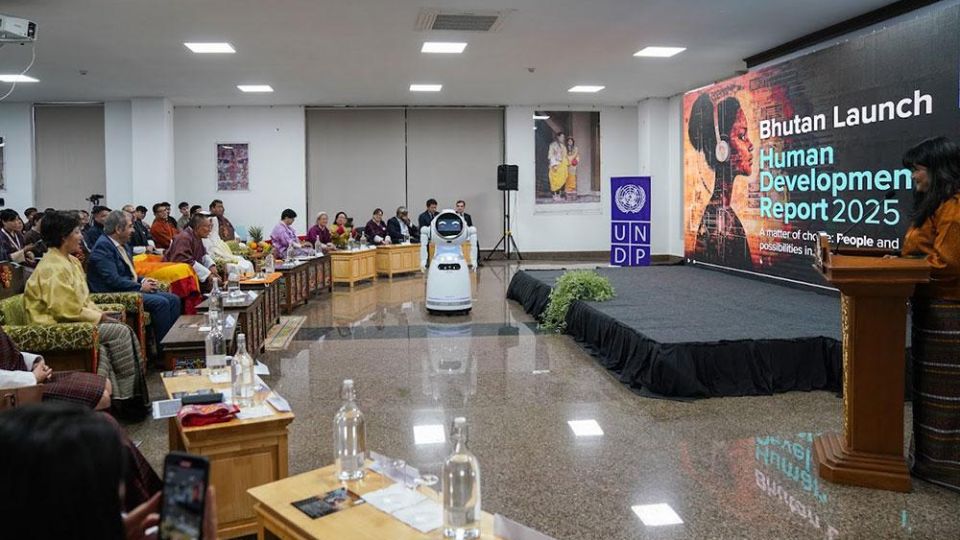May 30, 2025
THIMPHU – Bhutan achieved a significant milestone in 2023 by climbing to the 125th position out of 193 countries in the Global Human Development Index (HDI), according to the United Nations Development Programme (UNDP).
This marks an improvement from its 126th rank in 2022.
The UNDP’s Human Development Report 2025, titled “A Matter of Choice: People and Possibilities in the Age of AI”, launched yesterday places Bhutan among the Medium Human Development countries, where it outperformed 43 countries.
Bhutan’s HDI score stands at 0.698, just 0.002 points shy of crossing into the High Human Development category.
From 2010 to 2023, Bhutan recorded an average annual HDI growth rate of 1.26 percent. Prime Minister Tshering Tobgay recalled Bhutan’s position in 2005, saying, “At that time, our index, the Global Human Development Index, was just 0.52. Today, we are ranked 125th out of 193 countries.”
UNDP Bhutan official Tshering Choden, while presenting the findings, highlighted Bhutan’s consistent performance since 2018.
“Bhutan has consistently outperformed the South Asia average in HDI, reflecting stronger progress in health, education, and income,” she said.
In 2023, Bhutan’s life expectancy at birth was 73.0 years. Expected years of schooling reached 13.2, while the average years of schooling stood at 5.8. The Gross National Income (GNI) per capita was estimated at USD 13,843.
However, inequality remains a major challenge. Bhutan’s Inequality-adjusted HDI stood at 0.478, indicating a 31.5 percent loss in potential development due to inequality. The overall human inequality coefficient was 30 percent.
The report recorded 13.1 percent inequality in life expectancy, resulting in an adjusted life expectancy index of 0.708. Inequality in education stood at 48.2 percent, yielding an adjusted education index of 0.290. Income inequality was 28.6 percent, bringing the adjusted income index to 0.532.
On gender development, Bhutan recorded a Gender Development Index (GDI) of 0.958 in 2023, two ranks above its HDI position. The male HDI was 0.711, while the female HDI was 0.681.
Bhutan’s Gender Inequality Index was 0.278, placing it 71st globally.
In 2020, Bhutan’s maternal mortality ratio stood at 60 deaths per 100,000 live births. The adolescent birth rate in 2023 was 9.4 births per 1,000 women aged 15–19. Among those aged 25 and older, 65.4 percent of both men and women had at least some secondary education.
Labour force participation for both gender aged 15 and above was 72.4 percent.
Between 2012 and 2023, 12.4 percent of the population lived below the international poverty line of USD 2.15 per day (in purchasing power parity terms).
“Bhutan has nearly halved its HDI gap with the world average between 2010 and 2023,” said Tshering Choden. “This demonstrates faster progress than global trends.”
Despite Bhutan’s gain, the global picture is less optimistic. UNDP Resident Representative Mohammad Younus said that global human development has slowed to a 35-year low.
“And yet, AI offers a path forward, if we make the right choices,” he said.
The report outlines three pillars to harness Artificial Intelligence (AI) for human progress including building an economy where AI complements rather than replaces human work, using AI to drive scientific innovation, and investing in the skills and systems that enable people to thrive in an AI-integrated world.
Globally, inequality between low and very high HDI countries has widened for the fourth consecutive year. Vulnerable nations face what the report terms a “triple squeeze”—jobless industrialisation, mounting debt, and global trade tensions.
Yet people remain optimistic. According to the UNDP survey, one in five people worldwide already use AI. Sixty percent believe AI will have a positive effect on jobs.
In low and medium-HDI countries, 70 percent expect AI to boost productivity. However, a stark education gap persists between high- and low-HDI nations.


